People, Culture, and Contemporary Leadership: Ratan Tata
VerifiedAdded on 2023/06/09
|6
|1203
|428
Report
AI Summary
This report delves into the leadership of Ratan Tata, former chairman of Tata Sons, examining his impact on the Tata Group. The analysis explores the key traits and behaviors that contributed to his success, including his risk-taking attitude, focus on employee relations, and adoption of various leadership styles. The report identifies ways to measure leadership effectiveness, drawing on theories such as trait theory, behavioral theory, and situational leadership theory. It highlights how Ratan Tata fostered a collaborative environment, motivated employees, and adapted his approach to different situations. Ultimately, the report concludes that his ability to build interpersonal relationships and make courageous decisions were critical to his achievements. The references include journals and books related to the leadership and culture.
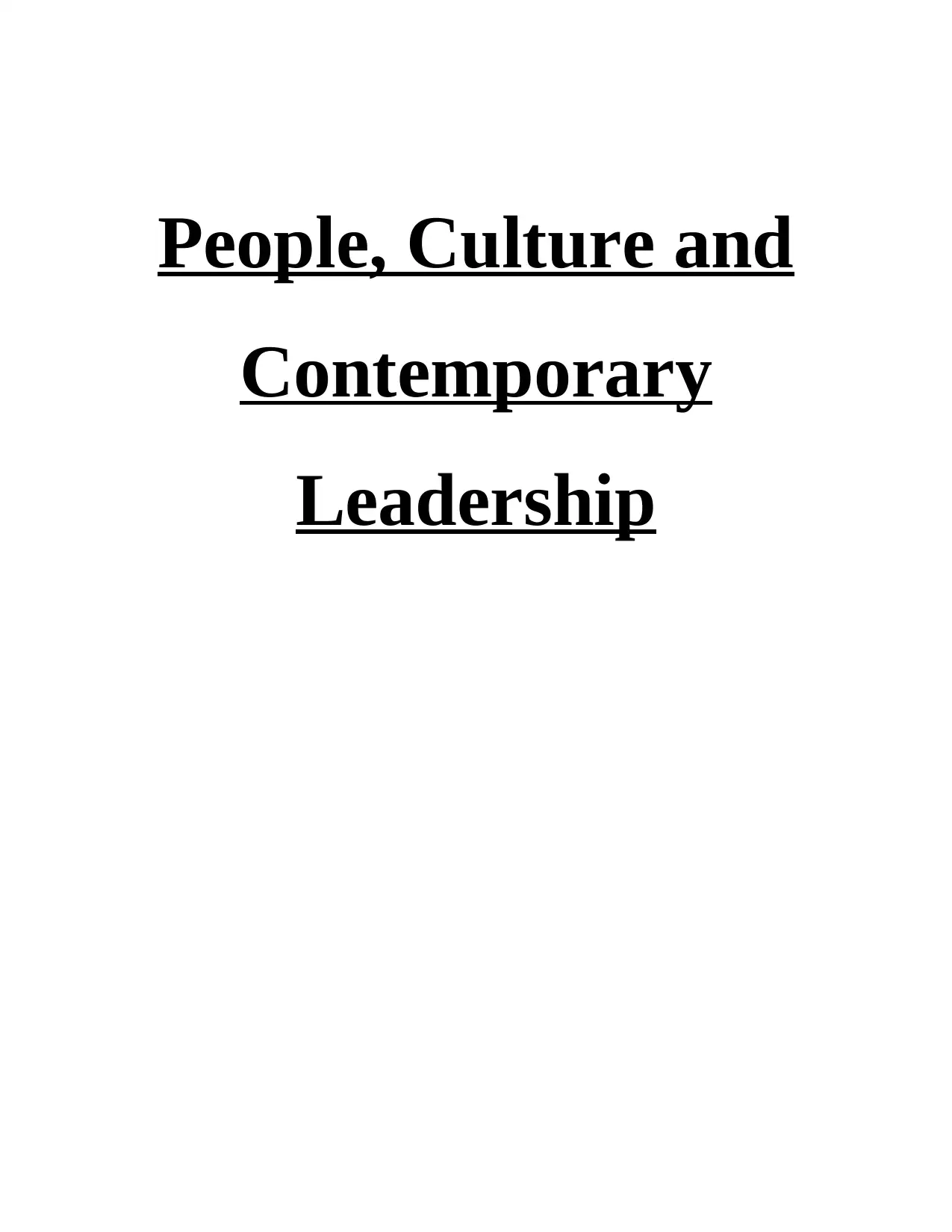
People, Culture and
Contemporary
Leadership
Contemporary
Leadership
Paraphrase This Document
Need a fresh take? Get an instant paraphrase of this document with our AI Paraphraser
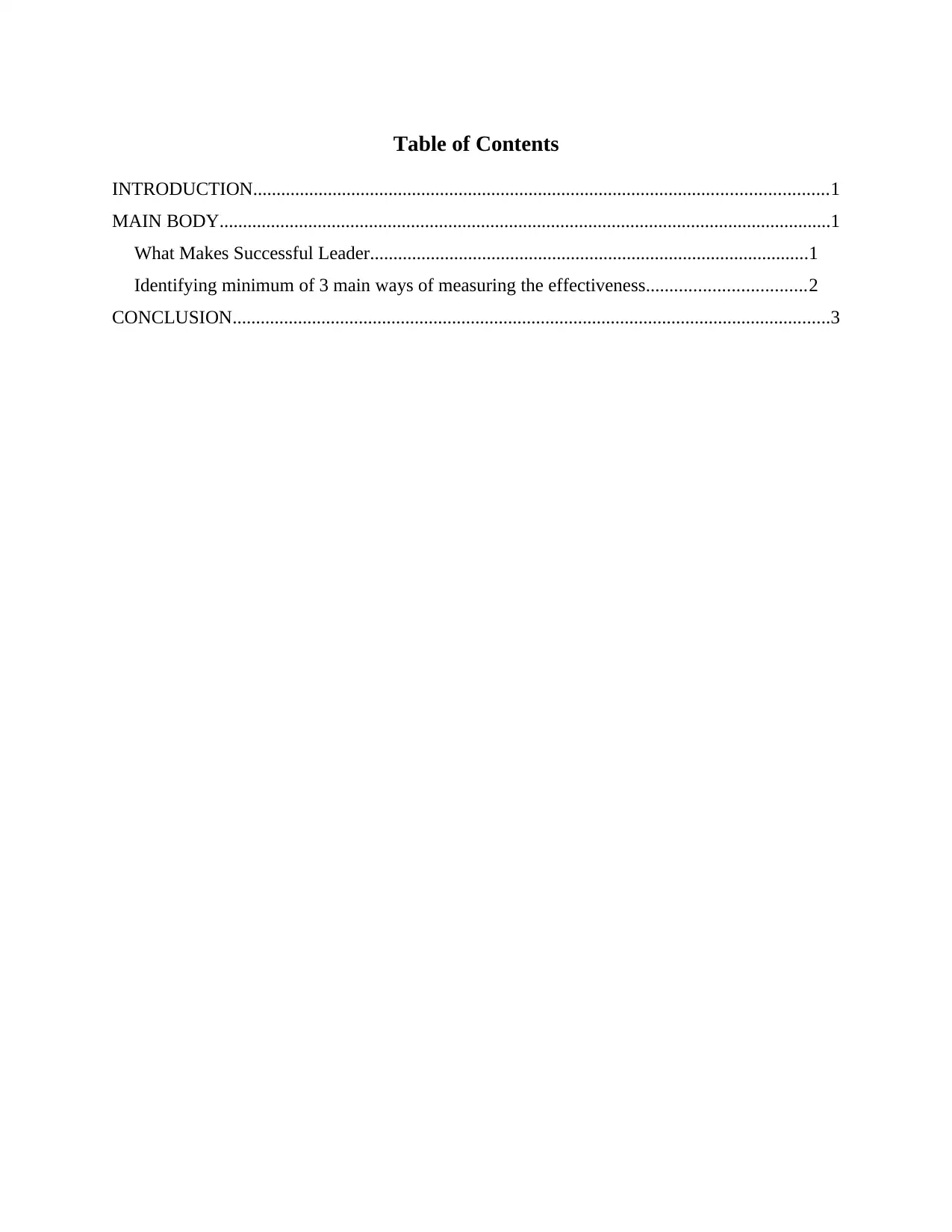
Table of Contents
INTRODUCTION...........................................................................................................................1
MAIN BODY...................................................................................................................................1
What Makes Successful Leader..............................................................................................1
Identifying minimum of 3 main ways of measuring the effectiveness..................................2
CONCLUSION................................................................................................................................3
INTRODUCTION...........................................................................................................................1
MAIN BODY...................................................................................................................................1
What Makes Successful Leader..............................................................................................1
Identifying minimum of 3 main ways of measuring the effectiveness..................................2
CONCLUSION................................................................................................................................3
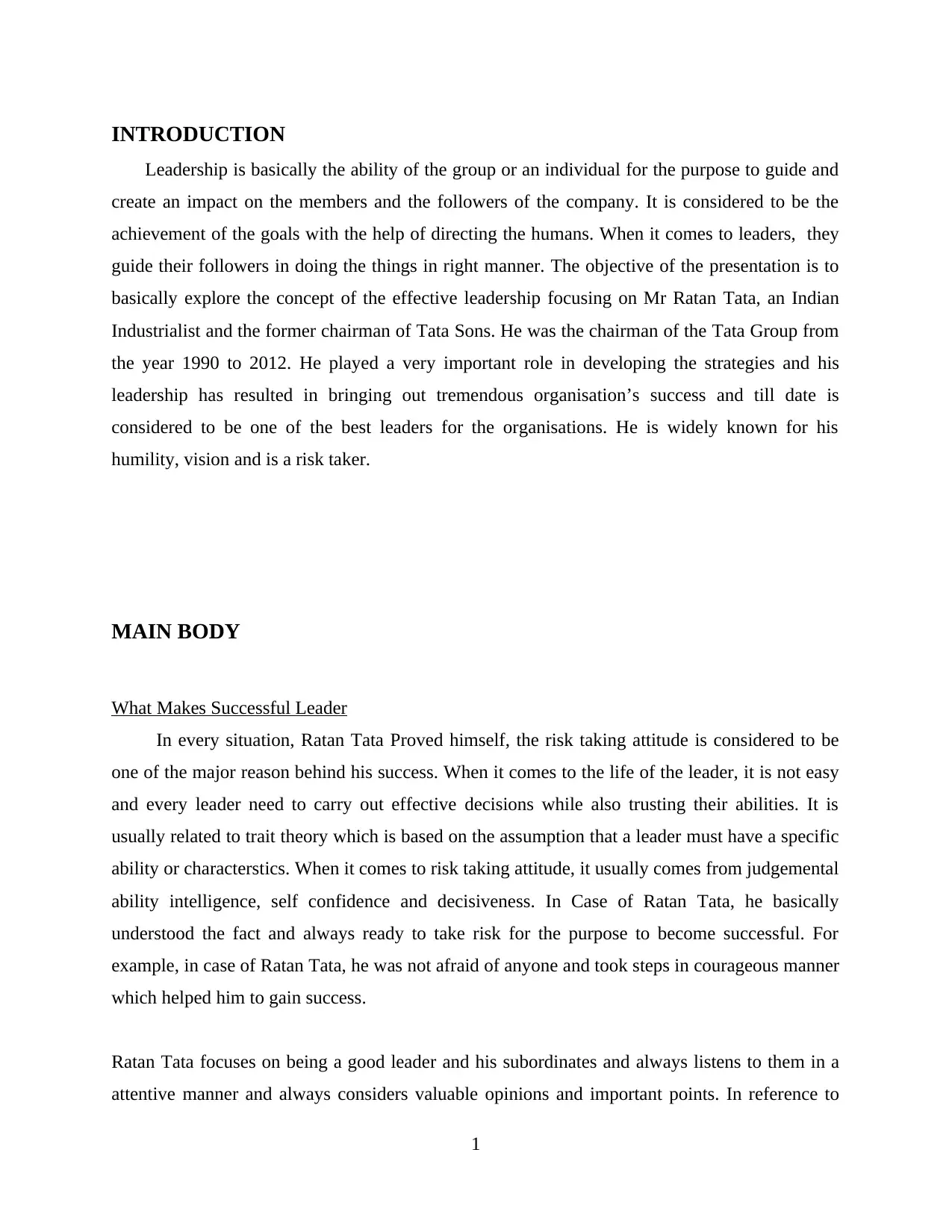
INTRODUCTION
Leadership is basically the ability of the group or an individual for the purpose to guide and
create an impact on the members and the followers of the company. It is considered to be the
achievement of the goals with the help of directing the humans. When it comes to leaders, they
guide their followers in doing the things in right manner. The objective of the presentation is to
basically explore the concept of the effective leadership focusing on Mr Ratan Tata, an Indian
Industrialist and the former chairman of Tata Sons. He was the chairman of the Tata Group from
the year 1990 to 2012. He played a very important role in developing the strategies and his
leadership has resulted in bringing out tremendous organisation’s success and till date is
considered to be one of the best leaders for the organisations. He is widely known for his
humility, vision and is a risk taker.
MAIN BODY
What Makes Successful Leader
In every situation, Ratan Tata Proved himself, the risk taking attitude is considered to be
one of the major reason behind his success. When it comes to the life of the leader, it is not easy
and every leader need to carry out effective decisions while also trusting their abilities. It is
usually related to trait theory which is based on the assumption that a leader must have a specific
ability or characterstics. When it comes to risk taking attitude, it usually comes from judgemental
ability intelligence, self confidence and decisiveness. In Case of Ratan Tata, he basically
understood the fact and always ready to take risk for the purpose to become successful. For
example, in case of Ratan Tata, he was not afraid of anyone and took steps in courageous manner
which helped him to gain success.
Ratan Tata focuses on being a good leader and his subordinates and always listens to them in a
attentive manner and always considers valuable opinions and important points. In reference to
1
Leadership is basically the ability of the group or an individual for the purpose to guide and
create an impact on the members and the followers of the company. It is considered to be the
achievement of the goals with the help of directing the humans. When it comes to leaders, they
guide their followers in doing the things in right manner. The objective of the presentation is to
basically explore the concept of the effective leadership focusing on Mr Ratan Tata, an Indian
Industrialist and the former chairman of Tata Sons. He was the chairman of the Tata Group from
the year 1990 to 2012. He played a very important role in developing the strategies and his
leadership has resulted in bringing out tremendous organisation’s success and till date is
considered to be one of the best leaders for the organisations. He is widely known for his
humility, vision and is a risk taker.
MAIN BODY
What Makes Successful Leader
In every situation, Ratan Tata Proved himself, the risk taking attitude is considered to be
one of the major reason behind his success. When it comes to the life of the leader, it is not easy
and every leader need to carry out effective decisions while also trusting their abilities. It is
usually related to trait theory which is based on the assumption that a leader must have a specific
ability or characterstics. When it comes to risk taking attitude, it usually comes from judgemental
ability intelligence, self confidence and decisiveness. In Case of Ratan Tata, he basically
understood the fact and always ready to take risk for the purpose to become successful. For
example, in case of Ratan Tata, he was not afraid of anyone and took steps in courageous manner
which helped him to gain success.
Ratan Tata focuses on being a good leader and his subordinates and always listens to them in a
attentive manner and always considers valuable opinions and important points. In reference to
1
⊘ This is a preview!⊘
Do you want full access?
Subscribe today to unlock all pages.

Trusted by 1+ million students worldwide
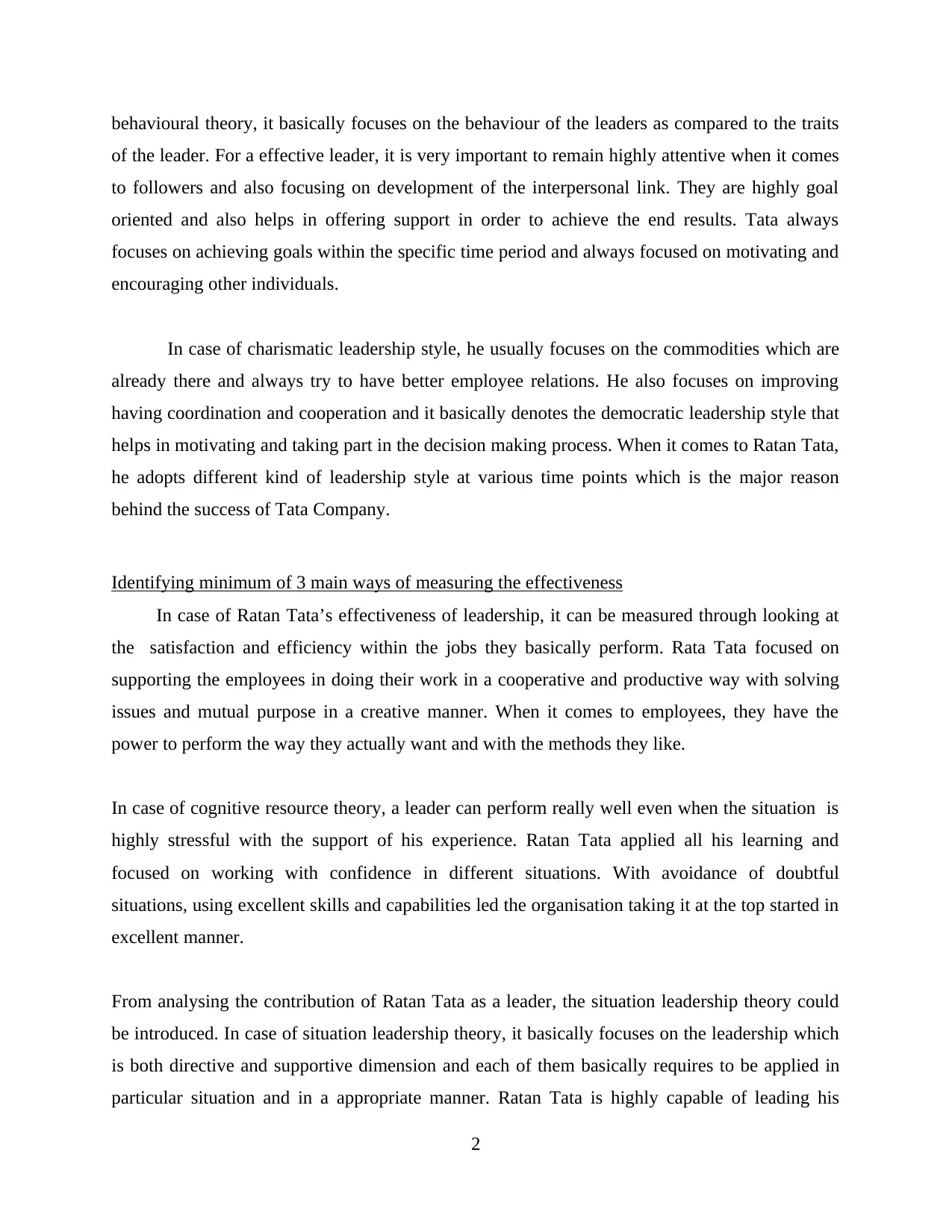
behavioural theory, it basically focuses on the behaviour of the leaders as compared to the traits
of the leader. For a effective leader, it is very important to remain highly attentive when it comes
to followers and also focusing on development of the interpersonal link. They are highly goal
oriented and also helps in offering support in order to achieve the end results. Tata always
focuses on achieving goals within the specific time period and always focused on motivating and
encouraging other individuals.
In case of charismatic leadership style, he usually focuses on the commodities which are
already there and always try to have better employee relations. He also focuses on improving
having coordination and cooperation and it basically denotes the democratic leadership style that
helps in motivating and taking part in the decision making process. When it comes to Ratan Tata,
he adopts different kind of leadership style at various time points which is the major reason
behind the success of Tata Company.
Identifying minimum of 3 main ways of measuring the effectiveness
In case of Ratan Tata’s effectiveness of leadership, it can be measured through looking at
the satisfaction and efficiency within the jobs they basically perform. Rata Tata focused on
supporting the employees in doing their work in a cooperative and productive way with solving
issues and mutual purpose in a creative manner. When it comes to employees, they have the
power to perform the way they actually want and with the methods they like.
In case of cognitive resource theory, a leader can perform really well even when the situation is
highly stressful with the support of his experience. Ratan Tata applied all his learning and
focused on working with confidence in different situations. With avoidance of doubtful
situations, using excellent skills and capabilities led the organisation taking it at the top started in
excellent manner.
From analysing the contribution of Ratan Tata as a leader, the situation leadership theory could
be introduced. In case of situation leadership theory, it basically focuses on the leadership which
is both directive and supportive dimension and each of them basically requires to be applied in
particular situation and in a appropriate manner. Ratan Tata is highly capable of leading his
2
of the leader. For a effective leader, it is very important to remain highly attentive when it comes
to followers and also focusing on development of the interpersonal link. They are highly goal
oriented and also helps in offering support in order to achieve the end results. Tata always
focuses on achieving goals within the specific time period and always focused on motivating and
encouraging other individuals.
In case of charismatic leadership style, he usually focuses on the commodities which are
already there and always try to have better employee relations. He also focuses on improving
having coordination and cooperation and it basically denotes the democratic leadership style that
helps in motivating and taking part in the decision making process. When it comes to Ratan Tata,
he adopts different kind of leadership style at various time points which is the major reason
behind the success of Tata Company.
Identifying minimum of 3 main ways of measuring the effectiveness
In case of Ratan Tata’s effectiveness of leadership, it can be measured through looking at
the satisfaction and efficiency within the jobs they basically perform. Rata Tata focused on
supporting the employees in doing their work in a cooperative and productive way with solving
issues and mutual purpose in a creative manner. When it comes to employees, they have the
power to perform the way they actually want and with the methods they like.
In case of cognitive resource theory, a leader can perform really well even when the situation is
highly stressful with the support of his experience. Ratan Tata applied all his learning and
focused on working with confidence in different situations. With avoidance of doubtful
situations, using excellent skills and capabilities led the organisation taking it at the top started in
excellent manner.
From analysing the contribution of Ratan Tata as a leader, the situation leadership theory could
be introduced. In case of situation leadership theory, it basically focuses on the leadership which
is both directive and supportive dimension and each of them basically requires to be applied in
particular situation and in a appropriate manner. Ratan Tata is highly capable of leading his
2
Paraphrase This Document
Need a fresh take? Get an instant paraphrase of this document with our AI Paraphraser
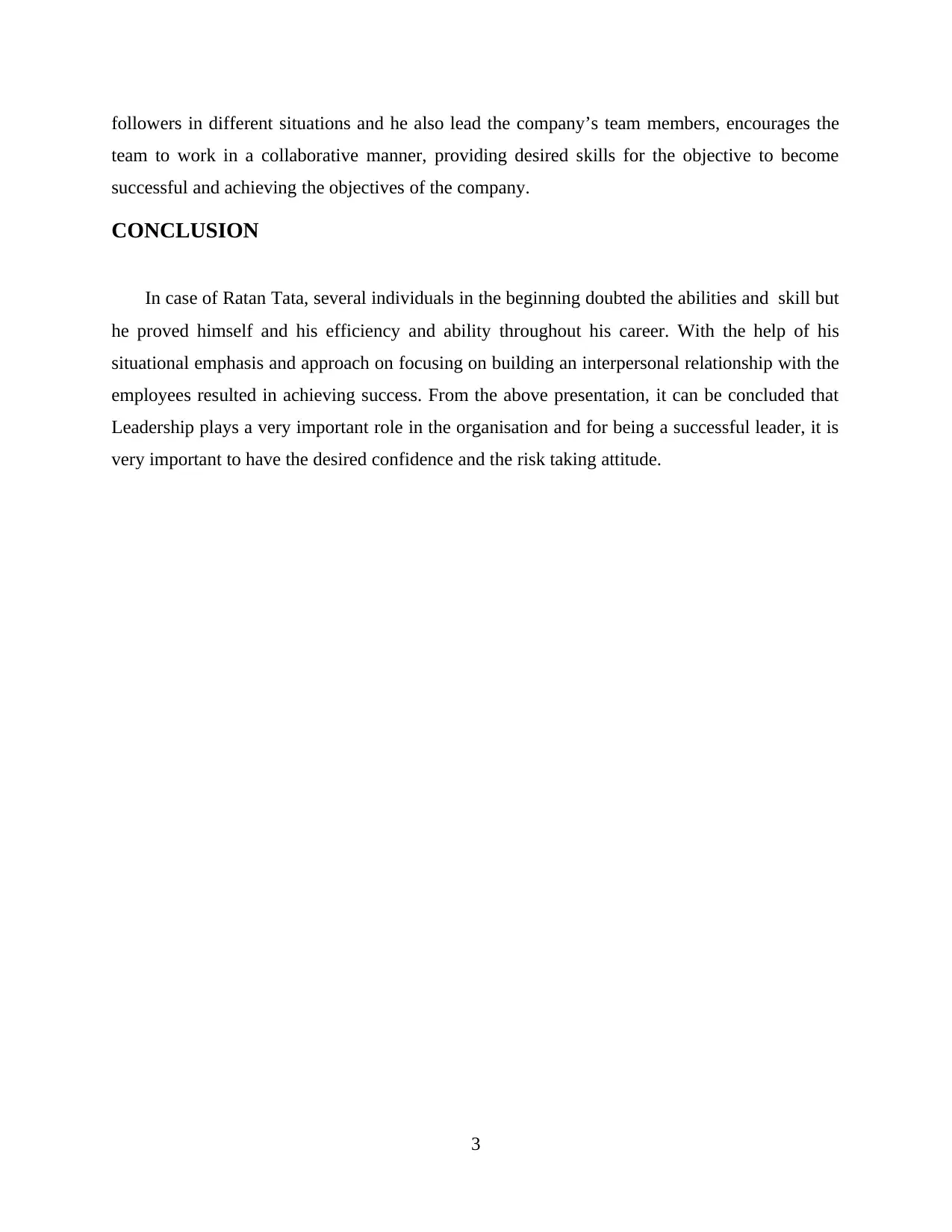
followers in different situations and he also lead the company’s team members, encourages the
team to work in a collaborative manner, providing desired skills for the objective to become
successful and achieving the objectives of the company.
CONCLUSION
In case of Ratan Tata, several individuals in the beginning doubted the abilities and skill but
he proved himself and his efficiency and ability throughout his career. With the help of his
situational emphasis and approach on focusing on building an interpersonal relationship with the
employees resulted in achieving success. From the above presentation, it can be concluded that
Leadership plays a very important role in the organisation and for being a successful leader, it is
very important to have the desired confidence and the risk taking attitude.
3
team to work in a collaborative manner, providing desired skills for the objective to become
successful and achieving the objectives of the company.
CONCLUSION
In case of Ratan Tata, several individuals in the beginning doubted the abilities and skill but
he proved himself and his efficiency and ability throughout his career. With the help of his
situational emphasis and approach on focusing on building an interpersonal relationship with the
employees resulted in achieving success. From the above presentation, it can be concluded that
Leadership plays a very important role in the organisation and for being a successful leader, it is
very important to have the desired confidence and the risk taking attitude.
3
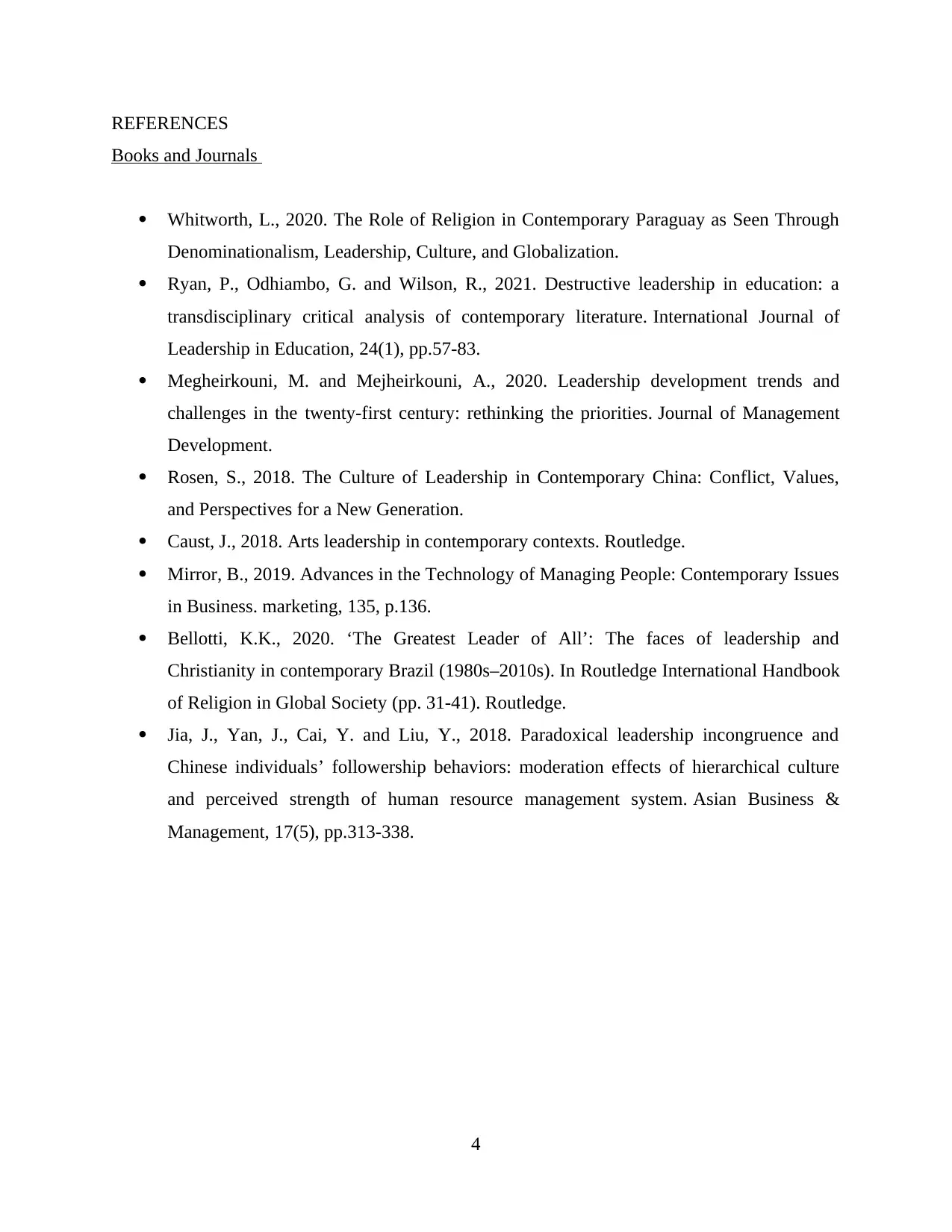
REFERENCES
Books and Journals
Whitworth, L., 2020. The Role of Religion in Contemporary Paraguay as Seen Through
Denominationalism, Leadership, Culture, and Globalization.
Ryan, P., Odhiambo, G. and Wilson, R., 2021. Destructive leadership in education: a
transdisciplinary critical analysis of contemporary literature. International Journal of
Leadership in Education, 24(1), pp.57-83.
Megheirkouni, M. and Mejheirkouni, A., 2020. Leadership development trends and
challenges in the twenty-first century: rethinking the priorities. Journal of Management
Development.
Rosen, S., 2018. The Culture of Leadership in Contemporary China: Conflict, Values,
and Perspectives for a New Generation.
Caust, J., 2018. Arts leadership in contemporary contexts. Routledge.
Mirror, B., 2019. Advances in the Technology of Managing People: Contemporary Issues
in Business. marketing, 135, p.136.
Bellotti, K.K., 2020. ‘The Greatest Leader of All’: The faces of leadership and
Christianity in contemporary Brazil (1980s–2010s). In Routledge International Handbook
of Religion in Global Society (pp. 31-41). Routledge.
Jia, J., Yan, J., Cai, Y. and Liu, Y., 2018. Paradoxical leadership incongruence and
Chinese individuals’ followership behaviors: moderation effects of hierarchical culture
and perceived strength of human resource management system. Asian Business &
Management, 17(5), pp.313-338.
4
Books and Journals
Whitworth, L., 2020. The Role of Religion in Contemporary Paraguay as Seen Through
Denominationalism, Leadership, Culture, and Globalization.
Ryan, P., Odhiambo, G. and Wilson, R., 2021. Destructive leadership in education: a
transdisciplinary critical analysis of contemporary literature. International Journal of
Leadership in Education, 24(1), pp.57-83.
Megheirkouni, M. and Mejheirkouni, A., 2020. Leadership development trends and
challenges in the twenty-first century: rethinking the priorities. Journal of Management
Development.
Rosen, S., 2018. The Culture of Leadership in Contemporary China: Conflict, Values,
and Perspectives for a New Generation.
Caust, J., 2018. Arts leadership in contemporary contexts. Routledge.
Mirror, B., 2019. Advances in the Technology of Managing People: Contemporary Issues
in Business. marketing, 135, p.136.
Bellotti, K.K., 2020. ‘The Greatest Leader of All’: The faces of leadership and
Christianity in contemporary Brazil (1980s–2010s). In Routledge International Handbook
of Religion in Global Society (pp. 31-41). Routledge.
Jia, J., Yan, J., Cai, Y. and Liu, Y., 2018. Paradoxical leadership incongruence and
Chinese individuals’ followership behaviors: moderation effects of hierarchical culture
and perceived strength of human resource management system. Asian Business &
Management, 17(5), pp.313-338.
4
⊘ This is a preview!⊘
Do you want full access?
Subscribe today to unlock all pages.

Trusted by 1+ million students worldwide
1 out of 6
Related Documents
Your All-in-One AI-Powered Toolkit for Academic Success.
+13062052269
info@desklib.com
Available 24*7 on WhatsApp / Email
![[object Object]](/_next/static/media/star-bottom.7253800d.svg)
Unlock your academic potential
Copyright © 2020–2026 A2Z Services. All Rights Reserved. Developed and managed by ZUCOL.





